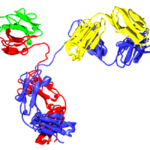1. Median progression-free survival was longer in the SG group than in the chemotherapy group.
2. Median overall survival was longer in the SG group as compared to the chemotherapy group.
Evidence Rating Level: 1 (Excellent)
Study Rundown: Tumour progression and poor prognosis are associated with trophoblast cell-surface antigen 2 (Trop-2), a transmembrane calcium transducer that is expressed at a high rate in tumours like HR+/HER2- and triple-negative breast cancers. Sacituzumab govitecan (SG) is a Trop-2-directed antibody-drug conjugate (ADC), which releases SN-38 in the tumour microenvironment and may have anti-tumour effects. This randomized controlled study aimed to compare SG against single-agent chemotherapy in patients who had HR+/HER2- endocrine resistant advanced breast cancer and received prior chemotherapy. The primary outcome of interest was progression-free survival (PFS) and secondary outcomes included overall survival (OS) and safety. The median PFS in the SG group was 5.5 months as compared to 4.0 months in the chemotherapy group. The median OS was longer in the SG group at 13.9 months, compared with 12.3 months in the chemotherapy group. It is noted in the study, however, that these are not yet final results. Regarding safety, the most common treatment-related adverse events (AEs) included alopecia, neutropenia, diarrhea, nausea, anemia, and fatigue. In the SG group, 14% experienced a serious treatment-related AE, as compared to 10% in the chemotherapy group. Six percent of patients in the SG group and 4% of those in the chemotherapy group discontinued treatment as a result of AEs. There were 6 deaths due to AEs in the SG group, compared with 0 in the chemotherapy group. Limitations to this study include that 22 assigned patients did not receive treatment in the chemotherapy group, which may have contributed to the observed shorter PFS. Additionally, interpreting the efficacy of the study requires caution due to the heterogeneity of patients’ previous treatments and that of the physician-chosen chemotherapy. Overall, the results from this study suggest that SG provides effective treatment for HR+/HER2- metastatic breast cancer.
Click to read the study in the Journal of Clinical Oncology
Relevant Reading: The emergence of trophoblast cell-surface antigen 2 (TROP-2) as a novel cancer target
In-Depth [randomized controlled trial]: This open-label, phase 3, randomized controlled trial was conducted out of 91 healthcare centres across Europe and North America. The study enrolled 543 adult patients to receive either SG or physician-chosen chemotherapy. There were 272 patients in the SG group and 271 in the chemotherapy group. The median duration of follow-up to the cutoff date was 10.2 months, 9.8 months in the chemotherapy group and 11.3 months in the SG group. In the SG group, the median PFS was 5.5 months (95% confidence interval (CI), 4.2 to 7.0 months) and in the chemotherapy group, it was 4.0 months (95% CI, 3.1 to 4.4 months) (hazard ratio (HR), 0.73; 95% CI, 0.60 to 0.88). The median OS was 13.9 months in the SG group (95% CI, 12.7 to 15.4 months) as compared to 12.3 months in the single-agent chemotherapy group (95% CI, 10.8 to 14.2 months) (HR, 0.84; 95% CI, 0.67 to 1.06). While there were 6 deaths attributable to AEs in the SG group only one of these was due to treatment (septic shock secondary to neutropenic colitis).
Image: PD
©2022 2 Minute Medicine, Inc. All rights reserved. No works may be reproduced without expressed written consent from 2 Minute Medicine, Inc. Inquire about licensing here. No article should be construed as medical advice and is not intended as such by the authors or by 2 Minute Medicine, Inc.


